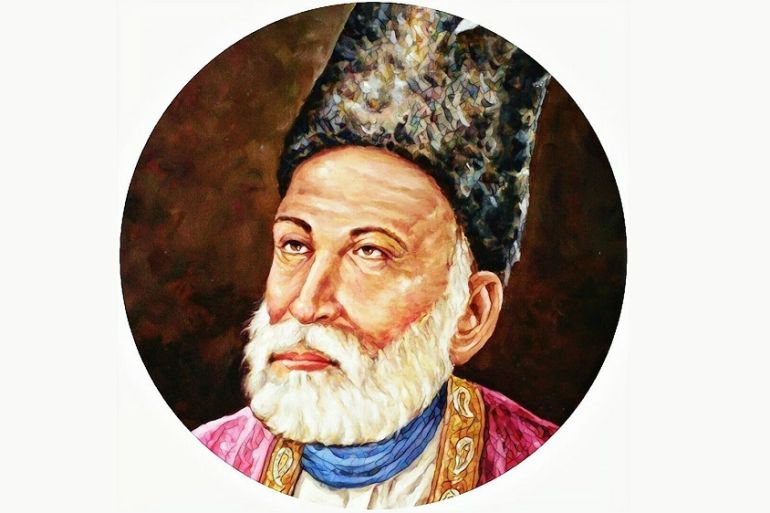Mirza Ghalib: Legendary poet of the Urdu language
Remembering one of the most popular and influential poet and writers of the Urdu language.

Mirza Ghalib, born on December 27, 1797, in Agra, was a well-known poet in the Persian and Urdu languages.
Today, he remains one of the most popular and influential masters of the Urdu language; he is known simply as Ghalib.
He remains popular not only in India and Pakistan but also among the diaspora.
In his honour, Google is changing its doodle to one portraying him. This is his story:
Persian poet
-
A prodigious poet. Mirza Ghalib started writing poetry at the age of 11. His verse is characterised by sadness, the result of an often tragic life. He was orphaned at an early age and lost all seven of his children in their infancy.
- The Conqueror. Born in Agra as Mirza Asadullah Baig Khan, who later used pen name “Ghalib” (the conqueror), he migrated to New Delhi where he lived for the rest of his life.
-
He struggled financially, never had a regular job and depended on patronage from royalty.
- The poet had an arranged marriage at the age of 13, but none of his seven children survived beyond infancy, tragedies which are reflected in his work.
-
Ghalib’s poetry. After marriage, he settled in New Delhi. In one of his letters, he describes his marriage as a second imprisonment after the initial confinement of life itself.
- The idea that life is one continuous struggle was a recurring theme in his poetry.
- Three forms of poetry. Ghalib’s best poems were written in three forms: ghazal (lyric), masnavi (moralistic or mystical parable), and qasidah (panegyric).
-
Ghalib took the concept of ghazals and changed them from an expression of anguish in love to philosophies of life.
- His critics accused him of writing in an ornamental style of Persian that was incomprehensible to the masses. But his legacy has come to be widely celebrated, particularly his mastery of the Urdu ghazal.
-
Gifted letter writer. Mirza Ghalib was also a gifted letter writer. His letters paved the way to a simpler usage of Urdu.
-
Before him, letter writing in Urdu was highly ornamental, his letters used common words to express ideas.
- Recognition. He was awarded the title Dabir-ul-Mulk by Emperor Bahadur Shah Zafar II in 1850, along with the title of Najm ud-Daulah.
-
He died in New Delhi on February 15, 1869. The house where he lived has been turned into a memorial and hosts a permanent Ghalib exhibition.
#MirzaGhalib the legend who gave a wide range of perspective to human life ! Remembering the greatest #Urdu poet on his Birth Anniversary is the least tribute! I would request the younger generations of today just to have a look to what he said 150 yrs back pic.twitter.com/fRdbPIwSIL
— zafar sareshwala (@zafarsareshwala) December 27, 2017
Ideas
- Seeking God. Ghalib placed a greater emphasis on seeking God rather than ritualistic religious practice.
-
In one of his poems, he wrote: “The object of my worship lies beyond perception’s reach; For men who see, the Ka’aba is a compass, nothing more,” according to William Dalrymple, in his book The Last Mughal: The Fall of a Dynasty, Delhi 1857.
-
“The prison of life”. The idea that life is a struggle which can end when life itself ends is recurrent in his poetry.
-
“The prison of life and the bondage of grief are one and the same. Before the onset of death, why should man expect to be free of grief?” he wrote.
-
Life is a playground. In Ghalib’s view, life was similar to a playground, where people are busy in mundane activity but not aiming for a major goal.
-
“Just like a child’s playground, this world appears to me. Every single night and day, this spectacle I see,” he wrote.
-
Final goal. His final aim with his writing? “I want to write lines that make whoever reads them, happy.”